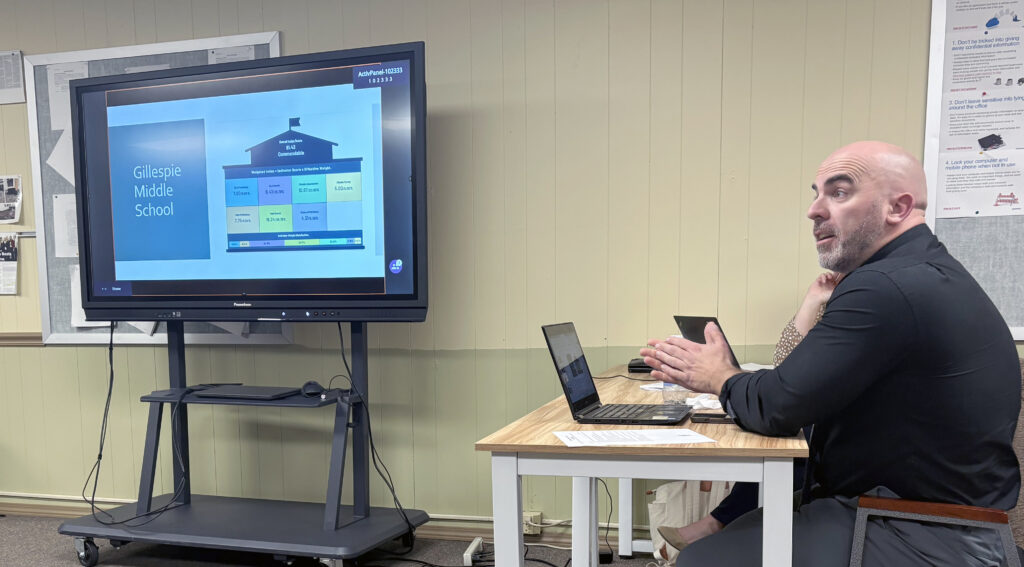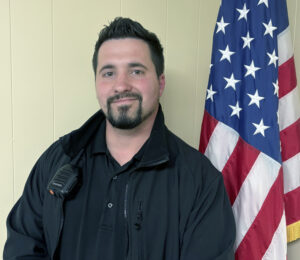Community News
School board adopts $18.5 million budget, votes to ban parent from school functions
Published
3 years agoon
By
Dave A

Community Unit School District 7 Board of Education members voted on Monday night to adopt an $18.5 million budget for the fiscal year that began July 1, and voted unanimously to ban a local parent from attending extracurricular activities on school property for the remainder of the 2022-23 academic year.
The board voted unanimously to adopt the district budget following 15-minute budget hearing required by law. During the hearing, Supt. Shane Owsley emphasized the budget reflects anticipated expenditures and revenues as of July 1 this year. Unexpected expenditures and/or revenue could require the budget to be amended at a later date. Owsley noted, however, that he included small amounts in several funds for contingencies as a hedge against having to formally amend the budget later.
Later in the meeting, the board authorized an application for a state maintenance grant of up to $50,000. Owsley said the district is authorized to use Elementary and Secondary School Emergency Replacement (ESSER) funds to fund the district’s match for the grant. If awarded, the grant will change both the revenue and expenditure sides of the budget, which would probably precipitate amending the budget.
Owsley said the district is continuing to benefit from substantial receipts of cash through the state’s Evidence-Based School Funding Formula. CUSD 7 current is rated as a Tier I school, which it is “considered a district most in need.” Next year, however, the district could be elevated to Tier II, which would reduce the Evidence-Based funding the district receives next fiscal year, according to Owsley.
“We have a balanced budget,” Owsley said. “Fund balances are going up with the exception of Capital Projects.” Once the debt incurred for building the middle school science lab is retired in July, the Capital Projects fund also should start to increase again.
The budget projects total revenues of $18,886,077 with expenditures estimated at $18,494,524, resulting in a budget surplus of $545,503. While this year’s budget is balanced, Owsley reminded the board it includes significant amounts of ESSER money that will disappear from the revenue stream in the next two years.
Fund balances at the beginning of the fiscal year totaled $10,611,222. With this fiscal year’s surplus, the district is expected to end the year with $11,002,775 in the bank—slightly more than half the district’s total operating budget.
With projected revenues of $13,405,997 and $13,131,543 in expected expenditures, the Education Fund comprises the lion’s share of the district’s overall budget. State funding is expected to represent 68 percent of total revenues. Local funding, including property taxes and fees, will represent 13 percent of the revenue, and federal sources, including ESSER funds, is expected to comprise 19 percent of the funding. Sixty-one percent of the fund’s revenues are expected to be spent on instructional costs, which includes teacher salaries. For the first time this year, Owsley earmarked two percent—nearly $285,000—for contingencies as a hedge against having to amend the budget if expenditures exceed the current estimate.
Revenue of $2,505,106 is expected for the Building Operations and Maintenance Fund with federal funding in the amount of $1,727,300 comprising nearly 70 percent of the revenue. Estimated expenditures include $2,369,615 for custodial salaries, general maintenance, supplies and utilities, plus a $60,491 cushion for contingencies. The Building Fund budget also includes $1.7 million in expected expenditures to upgrade the HVAC system for the high school/middle school complex.
The district’s Transportation Fund is expected to take in $782,798 in revenues, with 61 percent of that amount coming from state sources. Local revenue, including tax dollars and reimbursements from parent-funded sports programs, is expected to make up 31 percent ($237,791) of the total revenue. Projected expenditures include $60,717 set aside for contingencies with the remaining $647,081 in projected expenditures earmarked for support services, salaries and supplies.
For Debt Service, the budget anticipates revenue of $1,213,053 with projected expenditures of $1,226,473. Owsley said the district will make it’s final debt service payment for the Middle School science lab in July, which will substantially reduce expenditures from the fund for the remainder of the fiscal year.
Revenue for the Capital Projects fund is projected at $25,000 with revenue coming entirely from the county’s one-cent school facilities sales tax. The district expects $400,000 in sales tax revenue, but $153,950 will go Debt Service for science lab payments, along with $75,000 to pay down existing bond debt. Capital Projects has projected expenditures of $81,000, which would leave a deficit of $56,000 for the fiscal year. The fund started with a bank balance of $567,946, however, and will end the year with a $357,996 fund balance.

Working Cash fund revenue is projected at $34,651 with no anticipated expenditures. Revenue for the Illinois Municipal Retirement Fund and Social Security is expected to total $484,323 with expenditures of $482,604, and revenue for the Tort Fund is expected to be $435,749 with expenditures projected at $435,000. The Tort Fund is used to pay for legal services and insurance costs.
PARENT EXCLUSION
The board met in executive session for 70 minutes with much of the closed-door discussion apparently devoted to deciding whether or not to ban Jason Schalk, father of a Gillespie Middle School student, from attending sporting events and other extracurricular activities on school property for the remainder of the academic year. The executive session was preceded by 20-minute public hearing during which Schalk was permitted to present his side of a Sept. 8 incident during which he confronted head football coach Dalton Barnes.
Owsley told the board Schalk was accused of violating Section 830 of the board’s policy manual which states the district expects visitors to the campus to exercise “mutual respect, civility and orderly conduct” on school property. Specifically, the policy prohibits, among other things, threatening behavior toward staff members, harassment, unsportsmanlike conduct, the use of profanity and behavior that disrupts or impedes school activities.
Owsley said he was called to the football field during a Junior Varsity practice session after Schalk’s son “got into a heated argument” with Barnes. According to Owsley, the player called his father who arrived a short time later and confronted the coach. The ensuing exchange devolved into physical threats and shouted profanities.
In a meeting afterward in Owsley’s office, Owsley said Schalk acknowledged he “should have handled it better” and that he had made threats and used profanity.
“However, he felt there was wrong on both sides,” Owsley said.
Owsley reported that Schalk alleged Barnes was “in his son’s face” and spat on the 15-year-old player.
Speaking on his own behalf, Schalk told the board he was driving with his two other children in the vehicle when his son called him. “He was crying,” Schalk said. “He said the coach was ‘in my face, cussing at me and he spit on me’,” Schalk said he drove to the football field to deal with the situation.
“It was pretty obvious,” he said. “There was a 15-year-old kid off in the corner crying his eyes out because someone just spit on him. I was worked up. Some adult just spit in my son’s face. I’m still upset about it.”
Schalk admitted his language was profane during the confrontation, but he alleged Barnes’ approach to him also was laced with vulgarities. “He was cussing the same as me,” he said.
At some point, Schalk said he urged Barnes to come into the street for a fight and that Barnes initially agreed. Schalk said Barnes, however, stopped short of leaving the field, at which point Schalk suggested that he “call his boss.” Owsley reportedly arrived a few minutes later to defuse the situation.

“What’s being done to the coach?” Schalk asked. “I’ve been punished and my son has been punished. I’m seeking discipline for this guy. You just don’t spit in somebody’s face. That’s unsanitary. It’s disgusting.”
Owsley said that, if warranted, the incident could become a part of Barnes’ performance evaluation. Barnes is a first-year social sciences teacher and was hired as head coach this summer after former head coach Jake Bilbruck’s contract was not renewed.
Schalk alleged Barnes targeted his son because of a critical comment Schalk had posted on Facebook about Barnes’ coaching. He said Barnes belittled his son for wearing his football jersey to school while other students who did the same thing were not questioned. He claimed his son was harassed and targeted as retribution against him.
“I had forgotten about it,” he said. “I had forgotten about it. I put a critical comment on Facebook. When I remembered that, it all made sense.”
Jessica Street, another football parent, said a number of Junior Varsity parents had issues with Barnes. Asked how many parents had concerns with Barnes, Street replied, “At least 12. The majority of parents have a problem with Coach Barnes.”
Street also praised Schalk as a consistent cheerleader for Junior Varsity players, calling encouragement from the sidelines and boosting the team’s morale. Schalk said his son is considering quitting the team after the incident. “He said, ‘I look up in the stands to see you and you’re not there, and it just doesn’t seem right’,” Schalk reported.
Board member Bill Carter tried to confirm whether Barnes deliberately spat in the player’s face or if it was an inadvertent result of being in the boy’s face. Schalk claimed it was a deliberate act.

Returning to open session after deliberating about the incident, Board President Mark Hayes said written testimony from other coaches and players who witnessed the incident contradicted Schalk’s version of the incident. He noted that the board had the option of banning Schalk for a full calendar year but asked for a motion to instead exclude Schalk from extracurricular activities for the remainder of the school year. That penalty was unanimously imposed on a motion by Carter, seconded by Weye Schmidt.
Schalk did not react to the decision and left the meeting shortly after the vote.
BAND AND CHOIR TOUR
Following a brief presentation by band instructor Zach Simon and choir director Benjamin McCullough, the board approved an April trip for music students to Nashville, Tenn. The itinerary, offered by Educational Tours, Inc., includes visits to the Grand Old Opry, National Museum of African American Music, Ryman Auditorium and the RCA Recording Studio.
Planners tentatively planned to leave by chartered bus on Thursday, April 20, and return on Sunday, April 23, but may trim the trip by one day as a cost savings measure. Promoters originally priced the trip at $800 per student but recently notified Simon and McCullough that the cost had increased to $1,125.
The teachers said initial interest in the trip indicated they would have to take two coaches to accommodate students. If some students drop out before April, they said they might be able to cut back to one bus to save more money. As in past, the band and choir will sponsor fundraising activities over the coming months but participating students will be responsible for covering costs not covered by fundraising.
Due to the COVID pandemic, there has been no music tour since 2018 when the choir and band traveled to New Orleans. Board member Becky Hatlee said she went on that trip as a chaperone.
“It was a great trip,” she said. “This trip is incorporating more music-related activities.”
Hatlee moved to approve the trip with a second by Jack Burns.
INSURANCE POLICY
On the recommendation of Supt. Owsley, the board voted unanimously to renew a wide-ranging insurance policy and EWC Insurance and Zenith Insurance for an annual premium of $245,531. EWC provides coverage for property, liability, vehicles and umbrella coverage; Zenith provides coverage for workers compensation.
The new premium represents an increase of about $30,000 from last year’s premium of $218,666.
Owsley said the increase is due, in part, to the addition of the new Vocational Education building. Workers compensation increased significantly because “we had claims and they were big claims,” Owsley said.

At the request of board members, Owsley said he would seek bids from other providers for next year. Because the current policy is near termination, however, he recommended accepting the EWC/Zenith bid for this year.
REMOTE LEARNING CONTRACTS
In separate actions, the board accepted contracts with One Room, Inc. and Parallel, Inc. to provide remoter learning services through the district’s distance learning lab. Owsley said the remote learning options were necessary because the district has been unable to find a Spanish teacher for the district and has received no applications to fill and speech and language professional.
Parallel is providing speech and language services while One Room is filling the Spanish position.
High School Principal Jill Rosentreter said the Spanish sessions are going well, utilizing a remote Spanish teacher who actually is in Spain.
“Remote learning isn’t great,” Owsley said, “but at least it allows us to fulfill these requirements. It’s not perfect but it’s what we have.”
OTHER ACTION
In other action, the board:
- Voted to move existing accounts from Associated Bank, Benld, to United Community Bank, Gillespie, in view of Associated Bank’s intended closure of the Benld location. Board policy calls for school funds to be deposited locally.
- Accepted “with regret” the announced retirement of music teacher Leana Sawyer, effective at the end of the 2023-24 school year.
- Hire Jeff Mueller as district custodian, pending a routine background check, and voted to post a vacancy for a district custodian.
- Reviewed sixth-day enrollment figures which put school enrollment at 1,114 on the sixth day of the school year. Owsley said another 39 students have enrolled since then, bringing enrollment to 1,153. The enrollment figure is down slightly from previous years. The average enrollment over the past eight years is 1,257.
Comments
You may like
-


MCHS celebrates the season with “Ye Olde Christmas” Dec. 5-7
-
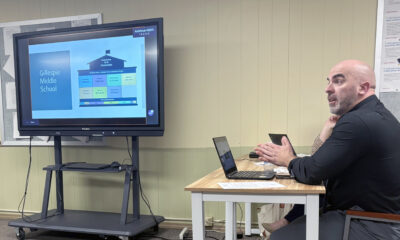

School board approves $3.9 million tax levy request; Eyes annual ISBE report cards
-


Gillespie gears up for 4th Annual Lighted Parade and Community Tree Lighting
-


Macoupin County Clerk, Recorder & Elections Office temporarily relocating due to courthouse renovations
-
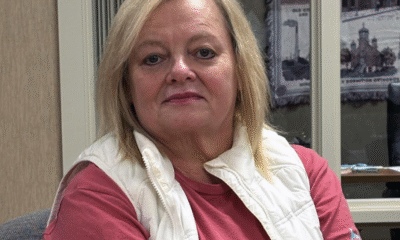

Long-serving Benld City Treasurer resigns
-


County board approves long-awaited AFSCME contract
Community News
MCHS celebrates the season with “Ye Olde Christmas” Dec. 5-7
Published
6 days agoon
November 28, 2025By
BenGil Staff
Ye Olde Christmas is the theme of the Macoupin County Historical Society’s annual Christmas Show, which will be held Friday through Sunday, December 5–7, at the John C. Anderson Home and Museum, 920 West Breckenridge in Carlinville.
“The Christmas Show is one of the most magical times to visit the Anderson Home,” said MCHS Board Member and House Manager Brandy England. “Some families make it an annual Christmas tradition to visit the Anderson Home when it is decorated for Christmas. It’s a great opportunity to get into the Christmas spirit and pick up some ideas for decorating your own home for the holidays.”
MCHS member Kendra Mize, of Bunker Hill, who has coordinated the decorating effort for more than two decades, has again marshalled a small army of volunteers to decorate all 13 rooms of the home. Each room features a themed Christmas tree, along with mantle pieces, centerpieces, tabletop decor, garlands and florals, and other special touches.
The home will be open for self-guided tours from 4 p.m. to 9 p.m. on Friday, December 5; from 9 a.m. to 9 p.m. on Saturday, December 6; and from 10 a.m. to 3 p.m. on Sunday, December 7.
“We’re very excited to offer for the first time candlelight tours from 6 p.m. to 9 p.m. on Friday and Saturday,” said Shawna Ashby, who serves as a co-manager with England. “Viewing the decorated home by candlelight promises to be a magical experience.”
The final candlelight tours on Friday and Saturday start at 7:30 p.m. Admission to the home is five dollars for adults and one dollar for children ages five to 12, with four-year-olds and younger admitted free of charge.
The Anderson Home Gift Shop will be open during tour hours, offering one-of-a-kind gift items and stocking stuffers. Santa Claus will be on hand in the downstairs parlor to greet children and listen to their Christmas wishes from 1 p.m. to 4 p.m. on Saturday, December 6.
While the decorated home is the centerpiece of the Christmas Show, several other features on the Historical Society’s grounds will be open. The Red Barn will be open and serving hearty beef stew, chili, homemade pies, and warming holiday beverages such as wassail and hot chocolate on Friday and Saturday.
The General Store and Print Shop will be decorated and open to the public, with the Print Shop offering its popular handmade Christmas cards and other items produced in the shop; kids can print their own blank “Santa List” to keep track of their Christmas wishes.
“The General Store offers unique gift items, including some small antiques, for shoppers to peruse,” England noted.
Local blacksmiths will demonstrate their craft in the MCHS Blacksmith Shop located on the north side of the Historical Society Grounds, with wrought iron gift items, including stocking hooks and decorative pieces, available for purchase.
The Macoupin County Historical Society’s Christmas Show runs concurrently with the Carlinville Christmas Market and Downtown Christmas events, and a free trolley and shuttle buses include the Anderson Home as a regular stop during the festivals, enabling visitors to ride from the square or the Macoupin County Fairgrounds to the Historical Society grounds.
Comments
Community News
School board approves $3.9 million tax levy request; Eyes annual ISBE report cards
Published
1 week agoon
November 26, 2025By
Dave A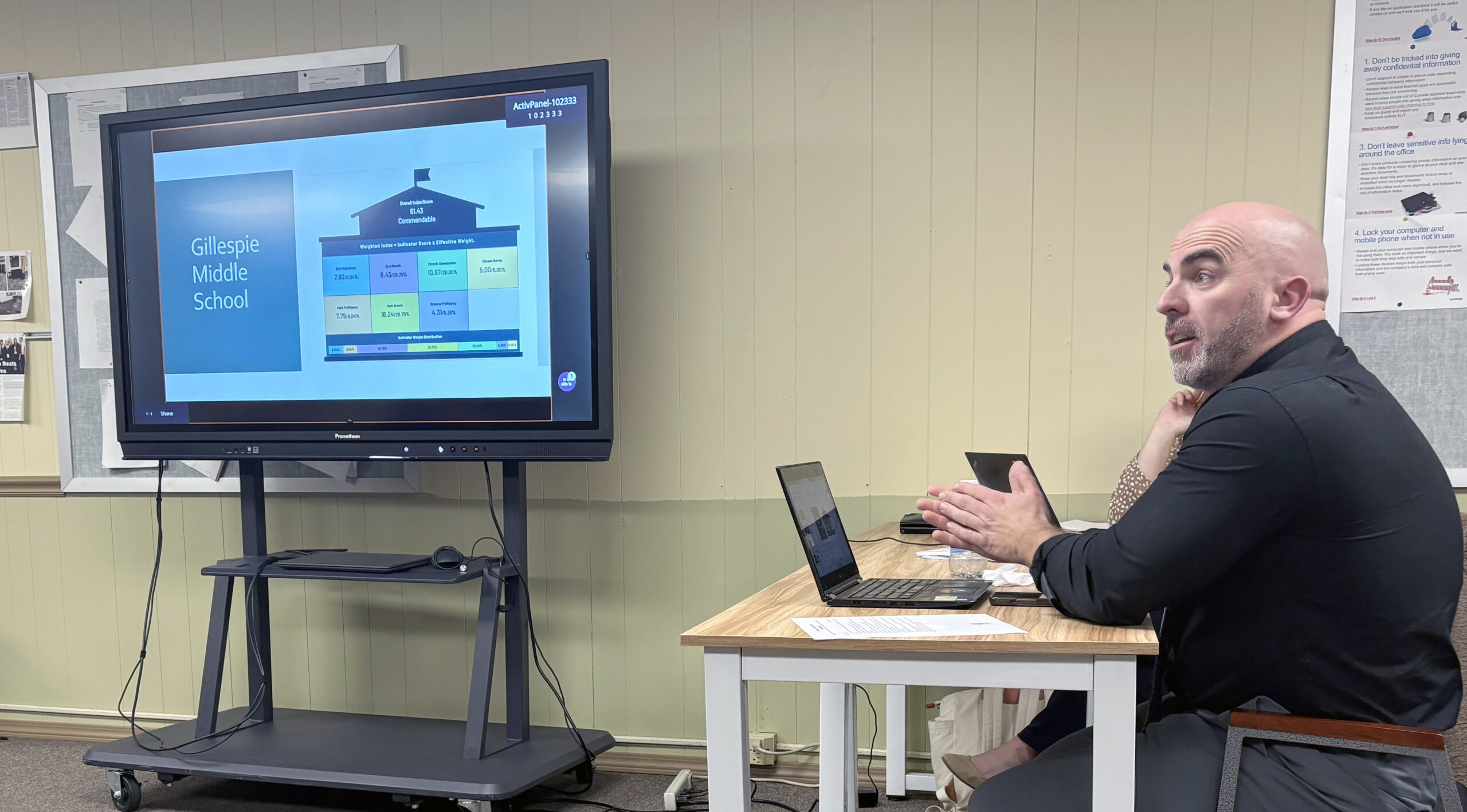
Members of the Community Unit School District 7 Board of Education on Monday night voted to approve a property tax levy request totaling $3,920,295 for 2025 property taxes payable in 2026. Because of tax caps and other factors, however, the district expects to collect only an estimated $3,786,607 of the requested amount.
In addition to acting on the tax levy, the board also held a lengthy discussion regarding annual district “report cards” issued by the Illinois State Board of Education to assess school performance from last year, approved a high school band/choir performance trip to Chicago in March, and agreed to apply for a school maintenance grant of up to $50,000 in matching funds.
The new proposed levy exceeds last year’s tax extension of $3,599,569 by more than $320,726—an increase of about nine percent if the levy were to be approved at the county level. The more realistic anticipation of $3,786,607 exceeds last year’s extension by $187,038, or an increase of about three percent. A Property Tax Extension Limitation Law (PTELL), approved by Macoupin County voters in 1995, restricts increases in the levy to five percent or the federal Consumer Price Index (CPI), whichever is less. This year’s CPI is estimated at 2.9 percent.
The approved levy seeks $1,650,000 for the Education Fund while expecting to realize $1,653,831; $450,229 for Operations & Maintenance, while anticipating $438,041; $200,000 for Transportation while expecting $180,434; $35,000 for Working Cash while expecting $42,602; $174,700 for the Illinois Municipal Retirement Fund while anticipating $117,788; $154,101 for Social Security while expecting $105, 248; $247,264 for Tort while anticipating $240,570; and $33,501 for Special Education while expecting $32,593. For Bond and Interest, which is not subject to PTELL, the district is levying $975,500 while anticipating the same amount.
Local property tax revenue accounts for about 20 percent of the district’s overall annual budget.
Because the levy request exceeds 105 percent of the previous year’s extension, a public hearing is required. That hearing is scheduled at the start of the board’s regular December meeting at 6 p.m., Monday, Dec. 15. In the meantime, the proposed levy is available for public inspection on the district’s website and in the district office.
Using a PowerPoint presentation, Owsley emphasized the levy request is essentially a wish list for what the district would like to raise through property taxes.
“The levy is the ‘Christmas list’ I talk about every year,” Owsley said. “If you don’t put it on the list, you’re not going to get it.”
Projecting what the district can legally seek under tax caps can be challenging because the district’s total equalized assessed valuation will not be confirmed until after Jan. 1 while state law requires the district to file its levy request before the end of December. For that reason, local school districts routinely file requests that exceed what they actually expect to receive in property tax revenue, and rely on the County Clerk to adjust the request to the maximum amount the district can receive.
“Because of tax caps, we have one shot to capture increases in the EAV and new construction,” Owsley said. “If we don’t do that, we lose it in perpetuity.”
To calculate the new levy, Owsley projected a 15.12 percent increase in the EAV—nearly double the previous year’s rate of increase. By overestimating the EAV growth, the district expects to capture the entire increase in assessed valuation when that number is finally determined.
“Even though we know the EAV will likely be around the historical average, we base our levy on a much higher amount so as not to lose revenue from new growth,” Owsley told the board. “We can do this without running the risk of overtaxing taxpayers because the district will receive no more than what we are entitled to by law.”
Owsley said relatively stable increases in EAV have resulted in a steadily declining tax rate. Since 2014 when the rate was $4.24 per $100 in EAV, the rate has fallen to $3.20 for 2024. In other words, the county can use a lower rate to generate the extension to which the district is entitled because the value of taxable property has increased.
“As long as the EAV goes up by more than the Consumer Price Index, our tax rates are going to go down,” Owsley noted.
SCHOOL DISTRICT REPORT CARDS
The board spent several minutes discussing recently released school report cards issued by the Illinois State Board of Education. Interested persons can view local report cards by visiting https://www.illinoisreportcard.com/.
All three attendance centers received a “Commendable” designation, meaning there are no student groups that are underperforming academically, and the high school graduation rate exceeds 67 percent. Last year, BenGil Elementary School achieved an “Exemplary” designation—the top designation a school can achieve.
Elementary Principal Angela Sandretto said administrators knew the school would not earn an Exemplary rating, even though students are state average in English/language arts, math and science. The Report Card designations are based on growth rather than academic performance. With students already exceeding state standards last year, the opportunity for growth was limited.
Assistant Principal Tara Cooper agreed, noting BenGil Elementary’s student performance is in the upper half of schools statewide that are meeting academic standards. “So, while we are not ‘Exemplary,’ we’re very happy with where we are.”
Supt. Owsley told the board the State Board of Education is working on revamping the assessment system because of the growth vs. performance issue. “That’s why they’re redoing all of this because they are penalizing schools for meeting goals,” he said.
For Gillespie Middle School, the report card shows students meeting or exceeding state averages in math and science but significantly lagging in English/language arts.
“ELA is our most concerning area,” Principal Patrick McGinthy told the board, “along with absenteeism.” The report card shows a chronic absenteeism rate of 25 percent, but Owsley and other administrators said the rate is exacerbated by the State Board of Education including nearly all absences whether or not they are excused.
Rosentreter noted the State Board will allow a student to be absent five days for illness without a doctor’s excuse. On the sixth day, however, the absence is unexcused unless the parent or guardian provides a doctor’s slip. Many parents, however, are reluctant to pay for a doctor’s visit for a child that is suffering from a minor illness.
McGinthy said Middle School teachers are attempting to address the deficiency in English/language arts by increasing writing exercises and requiring students to write in conjunction with other curriculum areas.
Rosentreter noted that the assessment standards for high schools differ from the standards for elementary and middle schools in that the State Board emphasizes graduation rates. For Gillespie, the graduation rate is an impressive 86 percent, though chronic absenteeism checks in at 31 percent.
“Math is definitely our shining star,” Rosentreter said, noting the school scored 17.8 points compared with the state average of 18. The school performed less well in the areas of English/language arts and science, scoring 16 points on ELA compared with the state score of 18 and 17.2 points compared with the state average of 19.
The report cards are based on results for the Illinois Assessment of Readiness (IAR) test for elementary and middle school students, and ACT scores for high school students.
Administrators said it’s difficult to motivate students to do well on state-mandated tests since the tests do not affect the student’s grade point average. To incentivize testing, Rosentreter said the high school is offering to let students skip final exams if they hit state standards on the mandated tests.
Owsley noted that the district report card documents the continuing decline in school enrollment—dropping from 1,325 seven years ago to 1,082 for the 2024-25 academic year.
“We don’t see that turning around anytime soon,” Owsley said. “It’s not just a Gillespie thing; it’s a trend for schools throughout Macoupin County.
BAND/CHOIR TRIP TO CHICAGO
Following a presentation by band/choir instructor Brad Taulbee, the board approved a high school band and choir performance tour to Chicago set for March 19-21. Taulbee said the tour company retained for the trip places emphasis on security and safety for traveling students. The company supplements hotel security with its own security personnel to monitor student rooms during the trip.
The tour includes workshop sessions at Vandercook College in downtown Chicago, and performances by the choir at the John Hancock Center and by the band at one of the city’s museums.
Taulbee said he is attempting to keep the cost affordable for participating students. Depending upon the number of students who ultimately go on the trip, he said he expects the cost to be about $739 per person. Additionally, he is lining up sponsors who can help with expenses for students who could not otherwise afford to participate.
“Security is my main concern,” said Board President Mark Hayes. “We just came back from there and seven people were shot in the area we were in.”
Taulbee said he expects to recruit seven to 10 chaperones and will ensure that the ratio of students to chaperones does not exceed 1:10.
SCHOOL MAINTENANCE GRANT
The board concurred with Supt. Owsley’s recommendation to again apply for a state School Maintenance grant of up to $50,000. The grant is a “matching” grant requiring the district to match grant funds dollar for dollar. The district has successfully applied for the grant for the past several years.
If the application is successful, Owsley said the funds will likely be used to remove asbestos-containing floor tiles in the choir room and elsewhere in the Middle School.
PERSONNEL
Following an executive session of about 40 minutes to discuss personnel and other issues, the board voted unanimously to accept the resignation of Tim Wargo as an assistant high school baseball coach and post the position as vacant, and voted to appoint Wargo as the head high school baseball coach for the coming season.
In separate actions, the board approved maternity leaves for Alexis Lupkey, district paraprofessional, and Gear-Up Coordinator Jordan Bartok. Lupkey’s leave is tentatively scheduled from Dec. 8 through March 18. Bartok’s leave is expected from Dec. 12 through Jan.6.
Board members voted unanimously to hire Christopher Whaley as a substitute bus driver, pending a routine background check and documentation of certification.
The board also voted unanimously to terminate Makayla Huff as a three-hour cook and post the position as vacant.
On a motion by Bill Carter, seconded by Weye Schmidt, the board voted unanimously to rehire fall coaches as follows: Jordan Bartok as head high school girls volleyball coach with Shelsie Price, as an assistant coach; Cory Bonstead as head football coach with Nate Henrichs, Jarrod Herron, Korben Clark, Alex Jasper, J.O. Kelly, Billy Gill and Florian Seferi as assistant and volunteer assistant coaches; Jay Weber as head coach for the parent-funded high school cross-country program with Jack Burns as a volunteer assistant coach; Jake Kellebrew as head coach for the parent-funded high school golf program, with Michael Otten as a volunteer assistant coach; Tim Wargo as head middle school baseball coach with Trae Wargo as assistant coach; Michelle Smith as head middle school softball coach with Jim Matesa, Joe Kelly and Melissa Heigert as assistant coaches; and Liz Thackery as head coach for the parent-funded middle school cross-country program with Laura Peterson as a volunteer assistant coach.
DISTRICT FOCUS
During a District Focus segment, Supt. Owsley introduced newly hired School Resource Officer Jacob Linhart, and High School Principal provided a report with photos of a recent school-wide Veterans Day observance.
Linhart, who has served five years as a police officer on the Gillespie Police Department, replaces Wade Hendricks, who recently retired after serving three years as the CUSD 7 School Resource Officer.
Linhart said it is a “great privilege” to serve as a Resource Officer, protecting students and staff. “I’m honored that you guys are allowing me to do it,” he said.
High School Principal Rosentreter said the school served breakfast to about 200 veterans and their families Tuesday morning, Nov. 11. Later, the veterans were joined by nearly 700 high school and middle school students for a recognition ceremony in the high school gymnasium.
Since the event coincided with the 25th anniversary of CUSD 7’s Wall of Honor program, the annual event did double duty as an induction ceremony for five are individuals, all of whom happened to be U.S. Military veterans.
The inductees included the late Sergeant Major John Marion Malnar, Command Sergeant Major John “Jack” Burns, Colonel Mark Daley, Lieutenant Colonel William P. Falke and Captain Robert Leone. Rosentreter said Daley and Leone traveled with their families from Colorado and Texas, respectively, to attend the ceremonies.
Burns, a retired CUSD 7 teacher, later visited BenGil Elementary School to present a program and teach students how to properly fold an American flag.
Rosentreter recognized the City of Gillespie for a donation of $1,000 to help purchase food for the veterans.
Born in Benld and a resident of Sawyerville, “Big John” Malnar earned a Silver Star during the Korean Conflict and a Gold Star, awarded posthumously after he was killed in action in 1968 in Vietnam. A Marine training center at Camp Geiger in North Carolina is named in his honor.
Though not a Wall of Honor inductee, Jacob Miller, a 100-year-old World War II veteran and recipient of two Purple Hearts, was recognized with a standing ovation.
The annual Veterans Day breakfast and ceremony provides students with an opportunity to meet and recognize local veterans as potential role models for their own futures.
Owsley said the event is a major event on the district’s calendar which grew out of a simple flagpole ceremony initiated 25 years ago.
CEJA GRANT FUNDS
Board members briefly discussed plans for about $74,000 in anticipated Climate and Equitable Jobs Act (CEJA) grant funds. The federal program is intended to compensate communities that have experienced revenue loss as a result of coal mine closures.
Owsley said the district committed about $86,000 in last year’s CEJA grant funds to the City of Gillespie to help pay for improvements to Plum Street, which is heavily used by district school buses. He has not transferred those funds, however, pending the start of the project.
Owsley said he was seeking the board’s input on how the money should be used.
“We could continue to partner with the city on Plum Street,” he said. “But there are plenty of project areas within the school.” The money could be used, for example, for continuing asbestos abatement. He identified other upcoming needs, including a new roof for the high school/middle school and an HVAC project.
President Hayes pointed out the school district paid for improvements to Kelly Street when BenGil Elementary was built and subsidized a project to reconfigure drainage on Broadway Street, in addition to the dollars committed for Plum Street.
“The school district is not in the business of building roads,” he said. “I think we’ve been more than generous with the city.”
Board member Peyton Bernot agreed the money should be committed for use by the school district.
TRIPLE I CONFERENCE
Several board members who attended a conference for board members and administrators Friday-Saturday, Nov. 21-23, in Chicago, commented briefly about their take-aways from conference sessions. Popularly known as the Triple I Conference, the convention is sponsored by the Illinois Association of School Boards, Illinois Association of School Administrators and the Illinois Association of School Business Officials.
Owsley said more than 700 Illinois school districts were represented, making the Triple I the largest gathering of education professionals in North America.
Bernot briefly reported on a session he attended regarding upcoming legislation and financial outlooks for school districts. He described the session as “much less optimistic” than sessions he’s attended in the past.
Owsley was among the convention presenters, discussing social-emotional learning. He commented that several districts attending reported efforts to involve students in school administrators. Some districts, he said, appointed a non-voting student representative to the school board to take part in discussions directly affecting students.
“When you think about it, we hear from faculty members and we hear from parents,” Hayes commented. “The people we don’t hear from are the most important part of what we do.”
Comments
Community News
Gillespie gears up for 4th Annual Lighted Parade and Community Tree Lighting
Published
1 week agoon
November 25, 2025By
BenGil Staff
The Holiday Sparkle Committee of Gillespie is preparing for the 4th Annual Holiday Sparkle Lighted Parade and Community Tree Lighting, set for Sunday, November 30, at 6:00 p.m. in downtown Gillespie. This beloved community tradition invites residents and visitors to kick off the holiday season with lights, music, and festive cheer.
Food trucks will line the parade route starting at 4:00 p.m., offering a variety of tasty options for families to enjoy before and during the celebration. The event will culminate in the illuminated parade and the ceremonial lighting of the community tree, signaling the official start of the season’s celebrations.
A highlight of this year’s festivities will be a special performance by Gillespie area students in grades 3 through 5. The group will join together to sing Christmas carols, lending their voices to the town’s joyous welcome to the holidays.
Parade participants are invited to bring extra sparkle to the evening—whether by entering a parade float, walking in the parade, or simply attending to enjoy the atmosphere. Participation helps make the event truly magical for the entire community. The only requirement for the parade is all entries have to incorporate holiday lighting.
To join the parade lineup, interested participants can sign up at https://forms.gle/L7Q4tEkgjj8Lt5E47. The Holiday Sparkle Committee expresses gratitude for the ongoing support of residents, businesses, and volunteers who help bring this festive occasion to life each year.
The second part of the holiday festivities will take place on Saturday, December 13 when the Sparkle will sponsor the vendor fair and food trucks in downtown Gillespie including a visit from Santa. Vendors will be located in the Gillespie Civic Center, Zion Lutheran Church, and Emma G’s Upscale Boutique while local businesses and eateries will also be open. An egg nog jog benefitting Gillespie Cross Country will also be held on December 13 and interested participants can join here.
The Holiday Sparkle Committee invites everyone to mark their calendars and join in the celebration. For more information, please contact the committee by email at gillespieholidaysparkle@gmail.com or visit Gillespie Holiday Sparkle on Facebook.





